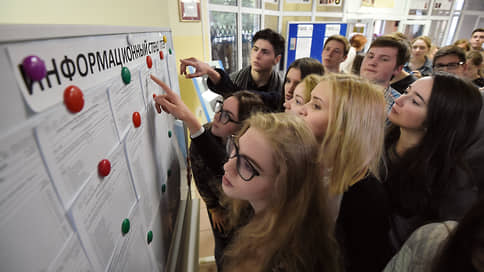Moscow schoolchildren trained for the exam
[ad_1]

Moscow Mayor Sergei Sobyanin announced that the average score of the unified state exam this year among metropolitan graduates has increased in almost all subjects. In the relevant department, they are sure that this is the result of an experiment in targeted preparation for the Unified State Examination: students of the eleventh grade “closed” the main school curriculum in six months, and then they studied only the Unified State Examination subjects. Rosobrnadzor says that it is premature to draw final conclusions about the results of the exam throughout Russia.
Moscow Mayor Sergei Sobyanin said in his blog that the USE results in the capital this summer are significantly better than last year. “The number of graduates who scored 100 points in one of the subjects increased by 45% – 2114 people. Nine guys scored a total of 300 points in three subjects. And the most important indicator, the average score, has grown in almost all subjects: Russian language, literature, biology, chemistry, physics, history, computer science, geography. The growth amounted to 13%,” the mayor reported.
In the Department of Education and Science of Moscow, the improvement in results is attributed to the fact that 80% of Moscow eleventh-graders have been studying in the new format for the past six months. Since February 2023, most metropolitan graduates have been preparing for exams in the format of workshops, which accounted for at least 40% of study hours every day. To do this, the entire curriculum was rebuilt: the subjects that schoolchildren did not choose to take the exam, they fully mastered by the end of January, and then they were engaged only in preparing for exams.
The department is confident that it is precisely thanks to this approach that the share of failures in the USE in the capital has decreased: “In literature, the number of twos has decreased by more than 4 times, in the Russian language by almost 4 times, in biology by 2.5 times, and in mathematics, English and history – almost 1.5 times. In addition, the proportion of graduates with a maximum of 100 points increased: in physics – 7 times, in biology – 5 times, in Russian and literature – 3 times, in English – almost 2 times, and in chemistry and computer science – 1.2 times.
Chairman of the Moscow City Duma Education Commission, honored teacher Yevgeny Bunimovich admits that the capital project benefited the graduates. “In fact, in all schools in our country, for the last six months, eleventh-graders have been only busy preparing for the Unified State Examination, they simply hide it,” notes Mr. Bunimovich. “And since the usual program is not designed for this, everything goes to the detriment of some topics.” But in the capital, exam preparation workshops were officially included in the curriculum, so it was possible to strengthen the individual approach and more harmoniously build the entire educational process, the expert is sure.
Rosobrnadzor told Kommersant that the results of exams on a Russian scale have not yet been fully analyzed, “therefore, we consider it premature to talk about the results of the USE and draw final conclusions.” The department also recalled that “we left the position of ranking regions based on the results of the Unified State Examination” due to cases of “incorrect interpretation of the results of the Unified State Examination and their distortion in order to improve the values of indicators, including through gross violations of the procedure for conducting the exam.” At the same time, Rosobrnadzor has already calculated the results of the main period for passing the exam (without reserve days). The trend of increasing the average score in literature, Russian language, physics, chemistry and biology is observed not only in the capital, but throughout the country, the department says. But the results in geography, computer science and history in Moscow have improved, but not on average in Russia.
Anna Musikhina, a social studies teacher and content producer at the Skysmart online school, notes that over the past ten years, the average USE results in each of the subjects have traditionally differed – within ten points. The expert explains these fluctuations by several factors. “Firstly, there are changes in the exam itself: tasks change from year to year, they can be easier or more difficult,” says Ms. Musikhina. points.”
“A few years ago, Moscow was not so noticeably ahead of other regions in terms of the quality of passing the exam,” says Irina Abankina, head of the Institute for the Development of Education at the National Research University Higher School of Economics. “But now the gap has begun to widen.” The expert is sure that this is happening, among other things, because Moscow schools managed to avoid a drop in the level of education during the pandemic. “Computer literacy of the capital’s schoolchildren and their families, and the development of e-education platforms in the city, both public and private, allow graduates to succeed in exams,” says Ms. Abankina.
But she calls the “greatest success” of Moscow schools the continued popularity of exams in technical subjects. “In the regions this year, the share of those who chose physics and profile mathematics has decreased by 33%,” Irina Abankina complains. “Despite the fact that regional universities are increasing budget places for technical specialties, because we need engineers. In Moscow, such a fall did not happen.”
[ad_2]
Source link








